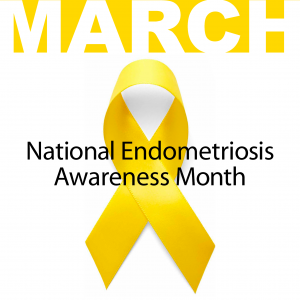By: Dr. Schmidt
 Did you know that approximately one in ten women of reproductive age experience endometriosis? Endometriosis is a condition in which the type of tissue that forms in the lining of the uterus is found outside of the uterus. This tissue responds to changes in estrogen that occur during the menstrual cycle. This can cause inflammation and irritation to the surrounding tissue, resulting in pelvic pain, heavy and painful periods, painful intercourse, and interference in normal bladder and bowel function.
Did you know that approximately one in ten women of reproductive age experience endometriosis? Endometriosis is a condition in which the type of tissue that forms in the lining of the uterus is found outside of the uterus. This tissue responds to changes in estrogen that occur during the menstrual cycle. This can cause inflammation and irritation to the surrounding tissue, resulting in pelvic pain, heavy and painful periods, painful intercourse, and interference in normal bladder and bowel function.
Endometriosis can also lead to infertility. Almost 40% of women with infertility also have endometriosis. The inflammation caused by endometriosis can cause scarring in the pelvis and damage to the fallopian tubes. Substances produced by this tissue can also interfere with ovarian function, sperm motility, fertilization, and implantation of an embryo.
Although endometriosis is a serious condition, there are options for relief; and we are here to help. Here are a few ways to manage endometriosis.
Dietary changes
No diet has been proven to treat/improve endometriosis. An anti-inflammatory diet that is rich in olive oil, nuts, leafy greens and fatty fish and limits processed meats, refined grains, sugar and fried food may be beneficial is decreasing pain. Turmeric and ginger have also been shown to decrease inflammation and pain (not specifically in endometriosis).
Medical treatments
Your physician may prescribe anti-inflammatory pain relievers or hormonal medications, such as birth control pills or an IUD, to help reduce pain and prevent endometriosis from getting worse. These medications do not get rid of already-existing endometriosis tissue.
Surgery
While surgery is not the first line of treatment, it may be done to aid in pain relief and improve fertility. Surgery is also generally required to definitively diagnose endometriosis. A drawback to surgery is that up to 80% of women experience pain again within two years of surgery. This is why other methods of treatment are encouraged first. A hysterectomy is not a treatment for endometriosis. There are many options for treatment to consider before surgery.
If you think you are experiencing symptoms of endometriosis, call Women’s Health Specialists to schedule an appointment at (920) 749-4000